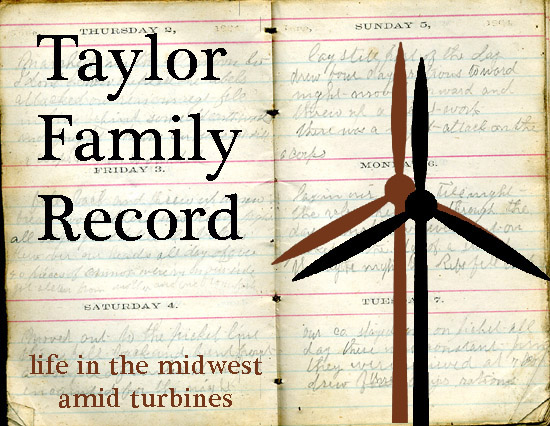4/30/08 Living Near Turbines: A Rural Illinois Family Tells Their Story: Part 1
"The situation with our son continues and the number of days a week he experiences problems increased when the turbines closest to our home came online in May. We have learned to cope by having him use earplugs during the day and we run a fan on high at night in his room. As for the headaches, our family has noticed a sharp decrease in them since the weather got cold. We are not outside as much and the windows are closed."

Today we feature excerpts from the story of a family we've been corresponding with in rural Illinois. In our first email from the mother of this family, we learned there were three industrial wind turbines located about 1500 feet from their home and a dozen or more half a mile away.
She writes:
We have had unofficial noise readings at the North wall of our home near 90dBA at times and have experienced headaches, sleeplessness, nausea, heart palpitations, increased blood pressure, a general feeling of being unwell, mild depression, and extreme pressure in our ears...
...If you had even told me last fall, (the turbines near us have been operational since May, 2007), that we would be having the type of problems we are having, I wouldn't have believed it. We knew last summer their were times it was uncomfortable, but the winter weather conditions have given me a whole new perspective of what it's like to live with turbines."
This was sent to us by the Taylor family of Illinois on February 21, 2008. They first heard of the possibility of a wind farm coming to their area in June of 2004 and attended an informational meeting presented by the developers.
The following is an excerpt of the Taylor family story:
"My husband and I went to the table with the township map of our area to see where turbines would be in location to our home. Nothing appeared to be too close, just a few little red dots north of our property. We introduced ourselves to the gentleman at the table and told him we were buying a farm in the area in a few days and we showed him where we were going to move to on the map. He told us we would be “Neighbors” to the project and that someone would stop by and talk to us in a couple weeks.
Knowing what we know now, warning bells should have been going off. Instead, in trusting Midwest fashion, we left feeling like this was a good thing for the community and thinking what nice people the developers were."
 (The Taylor family received the contract for neighbors to the wind farm in September)
(The Taylor family received the contract for neighbors to the wind farm in September)
Rene writes, "Upon reading the documents, we were shocked to see the list of items that we would be giving easement for. We were not experts on this type of thing, but it seemed like we would be signing away a lot of our rights as property owners. Nothing in the documents said anything about where or how many turbines or other facilities would be near us. In our opinion, the money they offered, ($250 upon executing the document, $250 when construction began, and $1000 per year for 30 years), was not worth the loss of our rights.We decided not to contact the developer to have the documents put in our name as we had no intention of signing away our rights. We decided to take a “wait and see attitude” and filed away the documents.
In June of 2005, we received a letter from McLean County Building & Zoning letting us know that [the developer] had filed a request for permits for the Wind Farm and that a public hearing would be held in a month. It also stated that [the developer] was requesting variances on the height and setback limits of some of the turbines.
At the time we did not know, but these types of notices are only sent out to people within 1000 feet of a purposed project. We had never had any dealings with the zoning process and were totally ignorant about how it worked.
About a week before the hearing, I contacted [the developer] by phone to try and find out what was going to be near us and how close it would be. I told him up front we were trying to decide if we would be opposing the project or not. He told me we would have one turbine 1500 feet from our home and that we would be able to see a couple more on the ridge. I asked him about the location of the substation. I told him we did not want to live by one because of the noise and the possible health effects from electro magnetic fields. He told me the substation was to be located near Arrowsmith, about 2 ½ miles from us. We felt a little reassured, but decided to attend the hearing to try and get a better feel for what was going on.
The hearings were scheduled to be held over two evenings in early July. There were only a small number of objectors to the project, I believe three. We listened carefully to all sides and again felt the wind company had answered our concerns. We decided not to testify against the project. The zoning board voted to approve the project with some of the requested variances and the official number of turbines to be built was 240 in two phases."
(In early 2006 the developer sold the project to another company and the Taylors received a notice from the Zoning Board of Appeals that the new company was requesting permission to buy a farmstead about a mile from their home to use as a visitor center and for operations and maintenance. They were also requesting to move an approved substation to much closer to the Taylor home.)
"It was at this point we became very concerned. We attended the hearing in early April, still unfamiliar with the zoning process. [The wind developer] and their local attorney [name] were sworn in and gave information on the proposed amendments to their Special Use Permit. Some board members seemed upset that the soil scores were so high in the area of the proposed substation and even asked if they couldn’t locate the facility in an area with poorer soil. [The developer] replied they really needed to use this area as it was closer to the center of the project and that they had been working with the farmer for over a year to purchase this location.
My husband and I were in shock. Nine months earlier we were told by this same gentleman not to worry because the substation would not be near us, now he says he’s known for more than a year they were trying to move it. When the board was done reviewing documents and asking questions, I was allowed to ask questions.
I asked how close the substation would be to our property line. [The developer] responded “about ½ a mile.” I then asked what kind of noise we could expect and was told it would be unlikely we would be able to hear the substation above the wind. While we were not happy, we voiced no further objections and the board voted to approve the changes. The County Board still needed to vote to approve the project on April 18 [The developer] spoke to us after the meeting and said they would have someone do a noise study and get the information to us.
A day or two after the zoning hearing, we observed workers staking out and area just east of our home. There was no way this area was a half mile away. My husband and I took a wheel and measured from the east edge of our property line to the west edge of the area being staked out. The measurement was 870 feet, a big difference from the half mile we were told at the zoning hearing."
The Taylor Family story continues--- we'll feature further excerpts in upcoming days.
 GOT TURBINE TROUBLES or CONCERNS? JUST PICK UP THE PHONE AND CALL 1-888-732-7234! The Coalition for Wisconsin Environmental Stewardship (CWESt) is a grass roots organization of made up of people concerned about the responsible placement of wind turbines. CWESt's primary goal is to provide a central source for both gathering and giving out reliable information about industrial wind plant siting, issues relating to the industrial wind turbines and the effects on residents. CWESt will take your concerns and information to our legislators in Madison. The number is good 24/7! The BPRC applauds CWESt for providing us with this very helpful resource.
GOT TURBINE TROUBLES or CONCERNS? JUST PICK UP THE PHONE AND CALL 1-888-732-7234! The Coalition for Wisconsin Environmental Stewardship (CWESt) is a grass roots organization of made up of people concerned about the responsible placement of wind turbines. CWESt's primary goal is to provide a central source for both gathering and giving out reliable information about industrial wind plant siting, issues relating to the industrial wind turbines and the effects on residents. CWESt will take your concerns and information to our legislators in Madison. The number is good 24/7! The BPRC applauds CWESt for providing us with this very helpful resource.